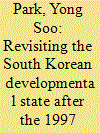|
|
|
Sort Order |
|
|
|
Items / Page
|
|
|
|
|
|
|
| Srl | Item |
| 1 |
ID:
086463


|
|
|
|
|
| Publication |
2008.
|
| Summary/Abstract |
Over the past decade, North Korea has been undergoing a severe economic crisis, resulting in extreme food shortages, and this has inflicted great suffering upon the North Korean people. Given such dire realities in the country, it is beyond all doubt that the North Korean government must carry out comprehensive economic reforms as quickly as possible, in order to transform North Korea's present inefficient socialist planned economic system into a market economy. Many, including myself, are of the view that economic reform would certainly lead to successful economic growth in North Korea, and this would in turn enhance the legitimacy of the North Korean regime itself. Nonetheless, the regime has consistently avoided carrying out economic reform, despite being presented with many good opportunities to succeed in doing so. The July First reforms of 2002 have been half-heartedly and inconsistently applied. This then raises a simple, but very important, question: Why has the North Korean government consistently avoided adopting comprehensive economic reforms? The present study pinpoints North Korea's unique monolithic system of political control and policymaking, which has the highest level of power concentration in one individual of all political systems, as the biggest barrier to economic reform. Despite the dire need for reform, the current North Korean regime has avoided it for fear of undermining this monolithic system.
|
|
|
|
|
|
|
|
|
|
|
|
|
|
|
|
| 2 |
ID:
107234


|
|
|
|
|
| Publication |
2011.
|
| Summary/Abstract |
This study reassesses the conventional wisdom surrounding the developmental state of South Korea (hereafter Korea) since the 1997 Korean financial crisis. The conventional wisdom is that, as a result of the continued structural reforms prompted by the crisis, the Korean developmental state, inherently characterised by active or direct state intervention, strong economic and industrial policies, the chaebol-oriented economic policy, and labour exclusion, has finally begun to dissolve in earnest. In this study, we have considered whether that is really the case and also which theoretical implications can be drawn from this consideration. Analysis of the Korean developmental state following the 1997 crisis has indicated that, quite contrary to conventional wisdom, the developmental state has continued to prevail as a core policy framework of the Korean administrations even after the crisis. There is no doubt that the continued structural and market reform after the crisis certainly undermined the Korean developmental state to a certain degree, but that does not mean the beginning of the end of the Korean developmental state at all. For much evidence strongly indicates that the Korean developmental state still remains intact and strong despite the structural reforms, on account of the successive Korean governments' assiduous and deliberate efforts to maintain and reinforce it. Even after the crisis, the Kim Dae-Jung and post-Kim regimes have hardly abandoned many of their market interventionist policies. Such market interventionist policies, which were routinely practised under the military regime in the 1960s and 1970s, diametrically contravene the argument that the Korean developmental state has begun to dissolve as a result of structural reform after the 1997 crisis. Contrary to conventional wisdom, the Korean developmental state persists as usual. All this information, then, suggests that path dependence is in action in the case of the Korean developmental state, and this suggests a further hypothesis that the Korean developmental state is very likely to persist in the future as well, despite increasing globalisation pressure, given the strong path dependence.
|
|
|
|
|
|
|
|
|
|
|
|
|
|
|
|
|
|
|
|
|